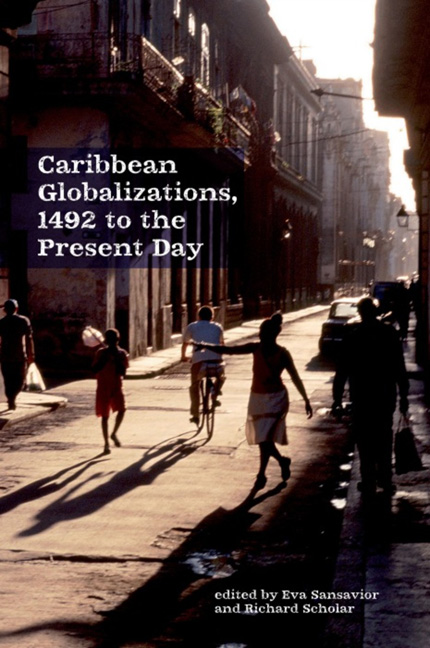Book contents
- Frontmatter
- Contents
- Contributors
- Prologue: Globalization, Globality, Globe-Stone
- Introduction
- I Globalizations in the Making
- II The Complex Present
- 6 Tobacco: The Commodification of the Caribbean and the Origins of Globalization
- 7 The Amaranth Paradigm: Amerindian Indigenous Glocality in the Caribbean
- 8 Aluminium: Globalizing Caribbean Mobilities, Caribbeanizing Global Mobilities
- 9 Race and Modernity in Hispaniola: Tropical Matters and Development Perspectives
- 10 Local, National, Regional, Global: Glissant and the Postcolonial Manifesto
- 11 Tropical Apocalypse: Globalization and the Caribbean End Times
- Acknowledgements
- Index
6 - Tobacco: The Commodification of the Caribbean and the Origins of Globalization
from II - The Complex Present
- Frontmatter
- Contents
- Contributors
- Prologue: Globalization, Globality, Globe-Stone
- Introduction
- I Globalizations in the Making
- II The Complex Present
- 6 Tobacco: The Commodification of the Caribbean and the Origins of Globalization
- 7 The Amaranth Paradigm: Amerindian Indigenous Glocality in the Caribbean
- 8 Aluminium: Globalizing Caribbean Mobilities, Caribbeanizing Global Mobilities
- 9 Race and Modernity in Hispaniola: Tropical Matters and Development Perspectives
- 10 Local, National, Regional, Global: Glissant and the Postcolonial Manifesto
- 11 Tropical Apocalypse: Globalization and the Caribbean End Times
- Acknowledgements
- Index
Summary
It is to the growing of tobacco that we owe the establishment of our colonies.
Jean-Baptiste Labat (1722: vol. 4, 533)The cultural landscape of tobacco consumption in Europe is well known. In this chapter, I shall consider the economic underside of that landscape, along with its determining impact on our modernity. And in order to make clear if not the idea then, at least, the tenor of this forgotten landscape, perhaps I may be permitted to cite this outburst from Waiting for Godot: ‘You and your landscapes! Tell me about the subsoil!’ (Beckett, 1977: 61). Let us now dig down to the colonial and capitalist subsoil of tobacco. The gist of my argument will be that Europeans, no sooner were they introduced to tobacco by the Amerindians, turned it into a global commodity. Globalization was the process whereby a natural product, once indissolubly linked to a variety of cultural practices, became the consumable good of a triumphant monoculture. This chapter will demonstrate that tobacco, as one of the very earliest global commodities, thus reveals the makings—and the inner workings—of our neo-liberal economic system.
A few opening remarks may be in order about the method I adopt in what follows and some of the key terms I use. This text may be described as ‘epiphilosophical’ on the grounds that, where philosophy treats of being qua being, epiphilosophy deals with matters within the circle of things of which, to paraphrase Protagoras, man is the measure. Philosophy begins precisely when what is at hand exceeds the circle of the human. Where the violence of philosophy is unhuman, in other words unrelated to the human, the violence that is to be found at work within the circle is anti-human. The deliberately eclectic sources used in this chapter—historical documents, canonical philosophical and literary works, ethnological analyses, critical works, and essays—enable us, by their very differences, to gauge the measure of this anti-human form of violence and to grasp the unity of a historical process that continues to this day.
We would do well to rid ourselves of the illusion that modernity is a recent phenomenon when it came into being, in fact, with the discovery of the Americas. Identifying what is at stake in our modernity means recognizing the length of its duration while also marking the local inflexions of a single process.
- Type
- Chapter
- Information
- Caribbean Globalizations, 1492 to the Present Day , pp. 155 - 172Publisher: Liverpool University PressPrint publication year: 2015

